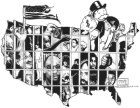Over the past four decades, the United States has become a vastly punitive nation, without historical precedent or international parallel. With roughly 5 percent of the world’s population, the U.S. currently confines about one quarter of the world’s prison inmates. In 2008, one in a hundred American adults was behind bars. Just what manner of people does our prison policy reveal us to be?
America, with great armies deployed abroad under a banner of freedom, nevertheless harbors the largest infrastructure for the mass deprivation of liberty on the planet. We imprison nearly as great a fraction of our population to a lifetime in jail (around 70 people for every 100,000 residents) than Sweden, Denmark, and Norway imprison for any duration whatsoever.
That America’s prisoners are mainly minorities, particularly African Americans, who come from the most disadvantaged corners of our unequal society, cannot be ignored. In 2006, one in nine Black men between the ages of 20 and 34 was serving time. The role of race in this drama is subtle and important, and the racial breakdown is not incidental: prisons both reflect and exacerbate existing racial and class inequalities.
Why are there so many African Americans in prison? It is my belief that such racial disparity is not mainly due to overt discriminatory practices by the courts or the police. But that hardly exhausts the moral discussion. To begin with, let’s remember the fact that the very definition of crime is socially constructed: as graphically illustrated by the so-called “war on drugs,” much of what is criminal today was not criminal in the past and may not be tomorrow.
Let us also frankly admit that a massive, malign indifference to people of color is at work. I suspect strongly, though it is impossible to prove to the econometrician’s satisfaction, that our criminal and penal policies would never have been allowed to expand to the extent that they have if most of the Americans being executed or locked away were White.
We must also frankly ask why so many African-American men are committing crimes. Many of the “root causes” have long been acknowledged. Disorganized childhoods, inadequate educations, child abuse, limited employability, and delinquent peers are just a few of the factors involved. In America, criminal justice has become a second line of defense, if you will, against individuals whose development has been neglected or undermined by other societal institutions like welfare, education, employment and job training, mental health programs, and other social initiatives. As a result, it is an arena in which social stratification, social stigmas, and uniquely American social and racial dramas are reinforced.
We should also remember that “punishment” and “inequality” are intimately linked-that causality runs in both directions. Disparities in punishment reflect socioeconomic inequalities, but they also help produce and reinforce them.
For people who go to prison, time behind bars almost always also diminishes their odds of living crime-free lives when they get out, by lowering employability, severing ties to healthy communal supports, and hardening their own attitudes. When such individuals return to their communities, they join many others with the same harsh life experience, often forming or joining gangs. This, in turn, further diminishes the opportunities that law-abiding residents in those same neighborhoods have to escape poverty or preserve the often meager value of their property.
Even if every sentence handed out to every prisoner were itself perfectly fair (an eminently dubious proposition), our system would still be amoral, because it punishes innocents. Those who claim on principled arguments that “a man deserves his punishment” are missing the larger picture. A million criminal cases, each rightly decided-each distributing justice to a man who deserves his sentence – still add up to a great and historic wrong.
Glenn C. Loury is the Merton P. Stoltz Professor of the Social Sciences and Professor of Economics at Brown University. He authored “Race, Incarceration, and American Values: The Tanner Lectures.” This article, the 10th of an 11-part series on race, is sponsored by the W. K. Kellogg Foundation, originally published by the Washington Monthly Magazine.
Related articles
- Americas racially skewed incarceration system is morally indefensible (sfltimes.com)
- America’s prison dilemma (louisianaweekly.com)
- Prison’s Dilemma (pndblog.typepad.com)
- Criminal injustice: The percentage of African-Americans in prison (tv.msnbc.com)
- “African Americans suffer from high rates of incarceration and crime. Here’s how to drastically reduce both.” (sentencing.typepad.com)

There’s more to the systemic problem for black and brown Americans than mass incarceration and the failed war on drugs.
You hit upon the twin evil of the problem of mass incarceration of urban poverty.
LikeLike
Richard Wershe Jr is serving a LIFE sentence for one *non-violent* drug charge he recieved as a minor (17 years old) back in May of 1987. Three years prior Rick was recruited by Federal agents and Detroit police as a teenage undercover informant in Detroit’s dangerous drug underworld of the 1980s. Rick’s release is long overdue!!
http://www.deadlinedetroit.com/articles/6448/steve_fishman_parole_board_lacks_guts_to_free_white_boy_rick#.UkjCD8c0_Mg
http://www.deadlinedetroit.com/articles/6344/michigan_parole_board_s_crime_against_white_boy_rick
http://www.thefix.com/content/story-white-boy-rick-richard-wershe-detroit-corruption70041?page=all
http://www.deadlinedetroit.com/articles/6565/white_boy_rick_reviews_amc_s_low_winter_sun
http://www.theoaklandpress.com/general-news/20130713/lake-orion-polices-tactic-of-using-child-informant-brings-back-memories-of-white-boy-rick-case?viewmode=fullstory
https://www.facebook.com/freewhiteboyrickwershe
http://www.change.org/petitions/free-white-boy-rick-wershe
http://freerickwershe.com/Home_Page.html
https://twitter.com/freerickwershe
LikeLike